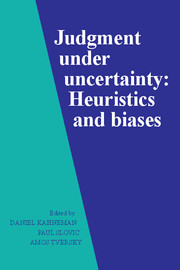Book contents
- Frontmatter
- Contents
- List of contributors
- Preface
- Part I Introduction
- Part II Representativeness
- Part III Causality and attribution
- Part IV Availability
- Part V Covariation and control
- 15 Informal covariation assessment: Data-based versus theory-based judgments
- 16 The illusion of control
- 17 Test results are what you think they are
- 18 Probabilistic reasoning in clinical medicine: Problems and opportunities
- 19 Learning from experience and suboptimal rules in decision making
- Part VI Overconfidence
- Part VII Multistage evaluation
- Part VIII Corrective procedures
- Part IX Risk perception
- Part X Postscript
- References
- Index
15 - Informal covariation assessment: Data-based versus theory-based judgments
Published online by Cambridge University Press: 05 May 2013
- Frontmatter
- Contents
- List of contributors
- Preface
- Part I Introduction
- Part II Representativeness
- Part III Causality and attribution
- Part IV Availability
- Part V Covariation and control
- 15 Informal covariation assessment: Data-based versus theory-based judgments
- 16 The illusion of control
- 17 Test results are what you think they are
- 18 Probabilistic reasoning in clinical medicine: Problems and opportunities
- 19 Learning from experience and suboptimal rules in decision making
- Part VI Overconfidence
- Part VII Multistage evaluation
- Part VIII Corrective procedures
- Part IX Risk perception
- Part X Postscript
- References
- Index
Summary
The flow of social experience frequently challenges us to recognize empirical covariations. Sometimes, these covariations are merely another test of our powers of observation and are of no immediate practical concern to us. At other times – for example, when those covariations involve early symptoms of problems and later manifestations, or behavioral strategies employed and outcomes obtained, or relatively overt characteristics of people or situations and relatively covert ones – such detection abilities may help to determine our success in adapting to the demands of everyday social life. More generally, covariation detection will play a large role in our continuing struggle as “intuitive scientists” (see Nisbett & Ross, 1980; Ross, 1977, 1978) to evaluate and update the hypotheses we hold about ourselves, our peers, and our society. An obvious question therefore presents itself: How proficient are we, as laypeople, at assessing the empirical covariations presented by experiential evidence?
Before proceeding to discuss past or present research, we should note that everyday observation provides a great deal of relevant evidence; and it hints that the answer to the proficiency question is apt to be far from a simple one. On the one hand, both the generally adaptive nature of social behavior and the generally harmonious quality of social interaction leave little doubt that the participants in our culture possess many profound insights about behavioral causes and consequences.
Information
- Type
- Chapter
- Information
- Judgment under UncertaintyHeuristics and Biases, pp. 211 - 230Publisher: Cambridge University PressPrint publication year: 1982
Accessibility standard: Unknown
Why this information is here
This section outlines the accessibility features of this content - including support for screen readers, full keyboard navigation and high-contrast display options. This may not be relevant for you.Accessibility Information
- 116
- Cited by
